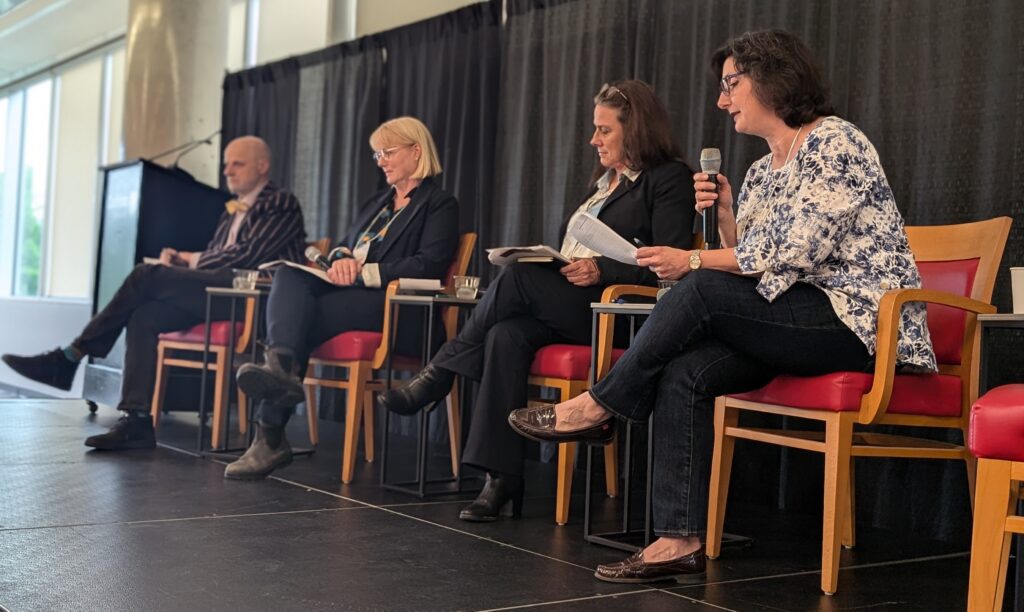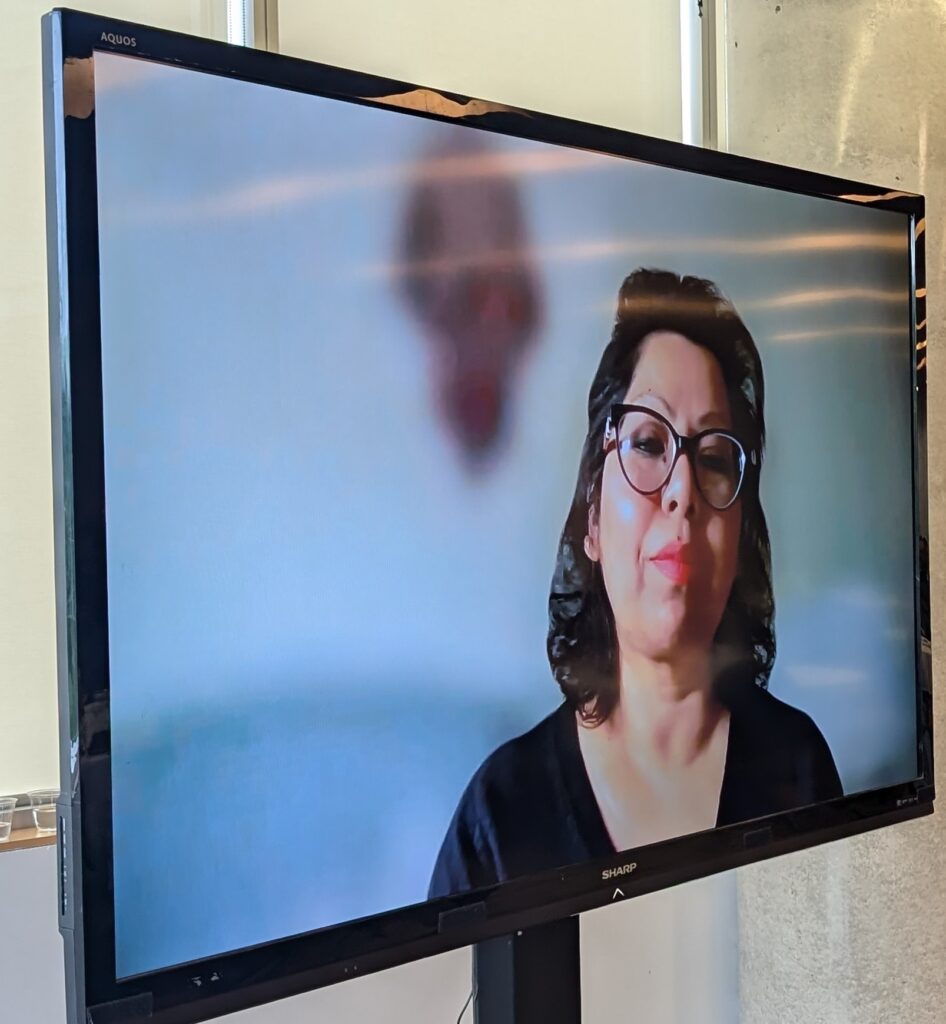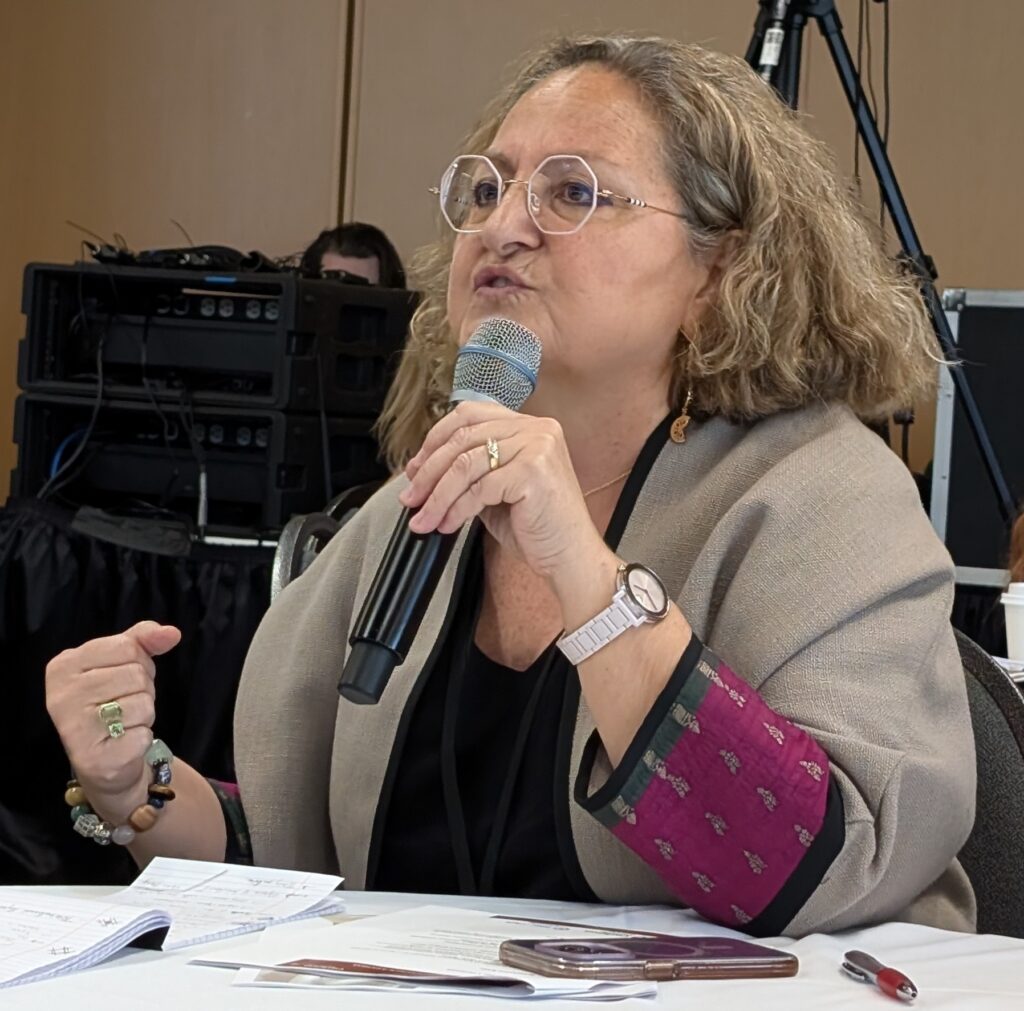
The two-day Safe Havens and Knowledge Networks in Canada conference concluded at Carleton University on May 23 with an urgent message from panelists to streamline and strengthen supports for scholars at risk during a time of intensifying attacks on academic freedom around the world.
The discussion with four panelists was led by moderator Dr. Catherine Khordoc, Carleton’s Deputy Provost of Academic Operations and Planning. The panel speakers were: Dr. Charles Reeve, associate dean and professor of visual and critical studies at Toronto-based OCAD University; conference co-organizer and SAR Carleton co-chair Norah Vollmer; Caroline Ford, director of the Democratic and Inclusive Governance Division at the Ottawa-based International Development Research Centre; and (via video link) Dr. Shuchi Karim, adjunct research chair at Carleton and IDRC research chair coordinator.
Each speaker offered unique perspectives and highlighted challenges facing scholars-at-risk networks in Canada and internationally as academic institutions try to respond to conflict and upheaval around the world resulting in growing numbers of displaced researchers, activists, artists and students.
The panelists focused on a range of priorities that emerged over the course of the conference, including knowledge gaps, systemic barriers to support, gender inequities and more.

Reeve, a member of SAR Canada’s steering committee, made timely reference to a U.S. court decision that day granting an injunction against the Trump administration’s attempt to block Harvard University’s right to welcome international students. Quoting the famed American cultural anthropologist Margaret Mead, he applauded Harvard’s risky fight for academic freedom against the U.S. president: “Never underestimate the power of a small group of well-organized and well-informed citizens to change the world.”
While discussing his role as a professor at OCAD — the Ontario College of Art and Design — Reeve emphasized the institution’s partnership with Scholars at Risk Canada and its unwavering commitment to supporting at-risk scholars. OCAD has initiated various programs, including annual lectures, a Global Scholars program, and collaboration with the New York-based Institute of International Education’s Artist Protection Fund to support at-risk members of the global community of creatives.
“There’s a direct connection between the conversations that happen around the visual arts and the conversations that happen around society and social change,” said Reeve. Authoritarian governments, he observed, “don’t want people talking about art, because they know if they start talking about art, the next thing you know, they’re going to be talking about every damn thing” — injustice, inequality, oppression and more. “We have an obligation to press that forefront globally.”
Reeve added: “We also know that as democracy starts to die in other parts of the world, as freedom of expression starts to die in other parts of the world, that sets the stage for it to start to die here at home, as well.”
“The borders aren’t going to open. It’s not going to become easier. It’s going to become harder . . . Now is the time for Canadian universities to show leadership globally about how they’re going to put their resources and their expertise to use in the regions.”
— Caroline Ford, director of the Democratic and Inclusive Governance Division, IDRC
Universities need to continue being involved with scholars-at-risk programs and maintain a welcoming environment for international students in this era of backlash and tightened restrictions on academic fredom. Postsecondary institutions, Reeve said, must “fight back against this trashing of your school’s reputation.”
“If a tiny, highly specialized, expensive-to-run art and design university can find a way to get involved with these programs . . . then everybody else can do the same thing.”
Karim discussed the IDRC’s Afghan Scholar at Risk program, which supports displaced Afghan researchers and activists in Canada. She noted how students in the program have faced challenges such as time constraints when being taken from an area of crisis to safety, as well as gaps between expectations and realities for scholars at risk.

“The time that lapses in between makes the scholar in question and his or their relevance in their own discipline, their work, more and more distant,” she said.
Karim also emphasized while many scholars are brought over because of empathy, that sentiment shouldn’t frame the relationship between individual and institution as charity. Some scholars, she warned, are often undermined by their institutions and don’t get to fully share their knowledge and showcase their potential.
“A scholar is not a charitable cause,” she said, emphasizing that supporting at-risk intellectuals, artists and others “is done for solidarity.”
Post-arrival care and support for mental health for displaced scholars is also a significant challenge that needs to be better addressed, she said. Karim noted how women take longer to become an academic after leaving their home country to seek safety, and that there needs to be more support for them.
“The kind of pressure women go through after displacement and trying to resettle is enormous,” she said. “It is unspoken and unrecognized… They often feel guilty for doing better than their spouses.”
She added that there needs to be a stronger, more coordinated national-level program to support scholars at risk where “investors can come together” and do more to understanding each scholar’s day-to-day realities and career circumstances.
Ford issued a direct challenging about the way we think of global oppression, and that universities need to alter their expectations about the number of visas being issued for international students and programs supporting at-risk scholars.
“The borders aren’t going to open,” she said. “It’s not going to become easier. It’s going to become harder.”
She suggested that more Canadian institutions should consider twinning with other academic institutions around the world to offer distance learning, for example, to support scholars who aren’t able to travel to Canada.
“Canada has an opportunity and a responsibility to lead. The world is witnessing rising threats to academic freedom, and yet displaced scholars and artists still face major barriers in Canada . . . We must move from reactive efforts to a coordinated and proactive national response.”
— Norah Vollmer, co-chair of Scholars at Risk Carleton
“Now is the time for Canadian universities to show leadership globally about how they’re going to put their resources and their expertise to use in the regions.”
Vollmer, Carleton’s manager of faculty affairs, reflected on the importance of the SAR movement and the work of the panelists and their institutions in preserving academic freedom. She also addressed the need to have SAR embedded in university structures to ensure sustained support, and to fully value as academic colleagues the displaced scholars who’ve found safe harbour in Canada.
“We are stewards of knowledge, and we are also communities of care,” said Vollmer. “We’ve learned that protecting academic freedom is not a side project. It is central to who we are as institutions of higher learning.”
Vollmer also included three practical recommendations to address key challenges, such as coordinating government programs in support of at-risk scholars across Global Affairs Canada, expanding research and educational agency initiatives, and establishing a sustainable national coordination body.
“Canada has an opportunity and a responsibility to lead,” said Vollmer. “The world is witnessing rising threats to academic freedom, and yet displaced scholars and artists still face major barriers in Canada . . . We must move from reactive efforts to a coordinated and proactive national response.”


